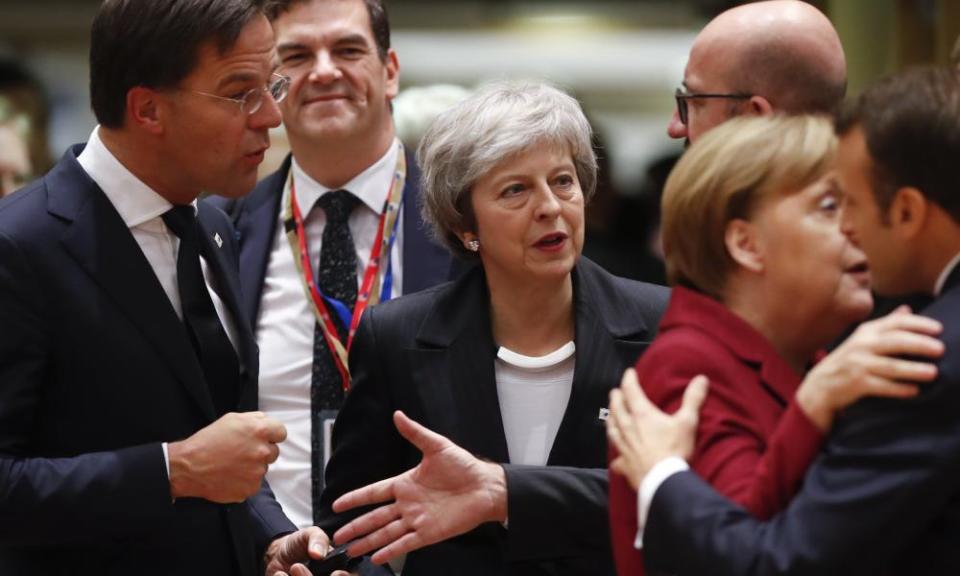The true deep-state conspiracy just benefits the old

Whatever the outcome of the European Union elections, it is only a matter of months before Theresa May’s successor is handed the task of scuttling over to Brussels in a desperate attempt to secure a fresh Brexit deal.
When they return empty-handed – which is certain when the project aims to secure access to the customs union, minus any treaty obligations or the Irish backstop – failure will be blamed on forces inside Europe’s “deep state”. A no-deal Brexit can only be the fault of Brussels – and that will be the public relations spin.
Steve Bannon, formerly adviser to US president Donald Trump, and his “alt-right” cronies have written the script and will hand it to the likes of Boris Johnson to undermine the stance of an EU that still protects the environment, consumers and workers alongside corporate interests.
Already, there is a narrative building around the idea that Europe is dominated by a shadowy elite primed to reject further overtures from the UK, while Brussels forges an even closer union among the remaining 27 countries.
There was a time when the deep state was a phrase owned by the liberal left. It described the US military industrial complex, which encompassed a group of corporate bosses and rogue government agencies hell-bent on circumventing democratic procedures to maintain power, notably portrayed in Hollywood movies like The Parallax View.
Later, the phrase was attached to the apparatus constructed by Vladimir Putin to keep him and his friends in power in Russia, and subsequently to countless leaders who saw themselves as too important to be booted out by their electorates: step forward, Turkish president Recep Tayyip Erdoğan.

Theresa May at an EU summit in Brussels.Photograph: Alastair Grant/AP
More recently the term has been adopted by Trump, who with Bannon’s help has cast himself as a victim of the same institutions. The former Ukip and now Brexit party leader Nigel Farage has followed suit, and when it comes to Europe, Johnson, Michael Gove, Andrea Leadsom or whoever becomes the next Tory leader will no doubt make the same complaint.
In this they will side with Matteo Salvini, the deputy leader of Italy’s League party; Marine Le Pen, far-right leader of France’s National Rally party; and Viktor Orbán, the prime minister of Hungary, who is known for his authoritarian rule.
Rather than dismiss the accusation, let’s examine the idea that Brussels is a deep state run by and for a political elite, pursuing a secret agenda. And more than that, it is operating in tandem with non-state forces, including upper echelons of the judiciary, the media and private corporate interests.
The idea is that Brussels was captured some time ago by centrist interests keen to frustrate free-market ideas as much as they have blocked the left’s socialist policies.
Given that the centre ground is where most people find themselves, it shouldn’t be surprising that EU institutions pursue this agenda.
One way we know about attitudes to the EU is the EU’s own barometer. Before you dismiss this out of hand as a rigged poll, it has been conducted for more than 40 years and last year showed that two-thirds of Europeans believe their country has benefited from being a member of the EU, the highest percentage since 1983. In addition, 60% consider EU membership a good thing.
This trend for increasing levels of satisfaction in the EU must be frustrating for Bannon, who has gone from being a strategist for Trump to co-founder of data firm Cambridge Analytica and self-styled one-man global disrupter, or as he likes to put it, “the infrastructure, globally, for the global populist movement”.
He will argue that the European commission and council of ministers, reflecting their role as essential elements of the deep state, are determined to undermine the populist movements of the EU newly represented in its parliament, many of them antagonistic to closer union.
But really Bannon and Farage’s insurgency is just a rebellion of the old. The barometer shows that the over-50s and the retired are prominent among the groups disapproving of the EU parliament, while the young and better educated are more enthusiastic.
Rather than ignore the interests of the old, it’s amusing that the Brussels agenda has in many ways sought to protect them. Austerity, with its demand for spending cuts en route to a balanced budget, is an idea supported primarily by older voters, not the young.
That fits with the UK’s experience, which is of successive Tory-dominated governments pursuing austerity while protecting pensions on behalf of largely elderly voters.
Does that make the UK government part of a deep state conspiracy? Or just representative of an over-50s audience that’s the largest and most consistent voting bloc?

 Yahoo News
Yahoo News 
